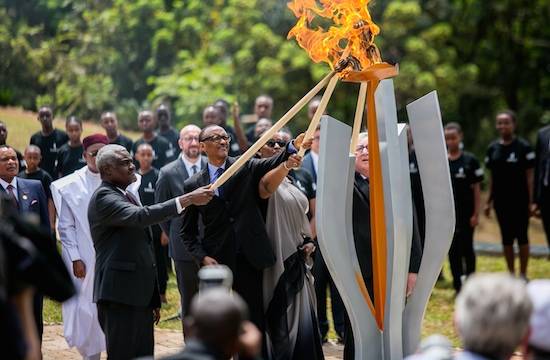Churches pray for youth as Rwanda remembers genocide
On 25th anniversary of African mass slaughter, leaders say investing in future generations key to societal change
Rwandan President Paul Kagame, his wife Jeannette Kagame, African Union Commission Chairperson Moussa Faki Mahamat and President of the European Commission Jean-Claude Juncker light the flame of remembrance at the Kigali Genocide Memorial during the commemoration of the 25th anniversary of the 1994 Rwandan genocide against Tutsi, in Kigali, capital of Rwanda, on April 7.(Photo by Xinhua/Office of the President of Rwanda/MaxPPP)
Rwandans have become “far better (people) than we were,” President Paul Kagame said as he joined the country in paying tribute to those who died during the genocide that began a quarter of a century ago.
“We are far better Rwandans than we were. But we can be even better still. We are the last people in the world who should succumb to complacency,” Reuters quoted him as saying at an April 7 ceremony in the capital Kigali.
Various Churches held special services stressing the need to live as “one” body under Christ — the need for people to coexist as “one Rwanda,” a predominantly Christian country.
“The motto for our country is unity, togetherness and oneness,” Jean Bosco, a Catholic priest serving in the rural village of Rugango in Rwanda’s Southern Province told reporters, according to The Christian Post.
Meanwhile, 2,500 kilometers north in the Ethiopian capital Addis Ababa, leaders of the African Union heard a speech by Tumukunde Gasatura, the Rwanda ambassador, urging African countries to invest more in young people to prevent similar atrocities in the future.
He called on the 20 nations that have not yet signed a U.N. Genocide Convention to do so, while Catholic, Christian, Evangelical, Orthodox and Muslim churches and mosques held prayers and asked that African youth be fully included in development agendas to transform societies.
Some 800,000 Tutsi and moderate Hutus were murdered during the three-month killing spree that exploded in April 1994 after the plane of former president Juvenal Habyarimana was shot down, killing him and his traveling companion, Burundi’s president Cyprien Ntaryamira. Both men were Hutus.
The Hutu military’s ethnic cleansing of the Tutsi minority was recorded in the 2004 Hollywood movie, Hotel Rwanda.
The landlocked East African country is now undertaking a week of ceremonies to commemorate the victims of the genocide.
Kagame began by laying a wreath at a memorial site where hundreds of thousands lay buried.
This was followed by speeches, songs by famous local artists, prayers and a candlelit vigil at a soccer stadium following a march from parliament, the media reports.
“There is no way to fully comprehend the loneliness and anger of survivors and yet over and over again we have asked them to make the sacrifices necessary to give our nation new life,” he said. “Emotions had to be put in a box.”
One of the positive legacies to emerge from the catastrophe was the birth of the International Criminal Court, which developed from a series of tribunals set up to prosecute those responsible for the most egregious crimes.
However some say the country’s scars will never heal.
Up to 10,000 people a day lost their lives during the conflict, with 70 percent of the Tutsi population wiped out by the time Kagame led the Rwandan Patriotic Front (RPF) in from Uganda to take control of the country in July.
A dictatorship ensued to quell dissent. Rwanda has since prospered economically but critics say enough time has lapsed for the government to loosen its control on people’s rights and allow more freedom of expression.
Published on the La Croix International website


